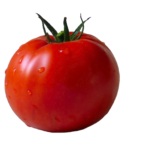Prostate cancer is the second most common cancer in American men. In simple terms, cancer is a disease characterized by abnormal cells growing and invading normal cells in the body. Prostate cancer is an overgrowth of abnormal cells in the prostate gland. It usually grows at a slow pace but in some cases can grow rapidly. In early stages, men usually have no symptoms. One in seven men or about 14% of men will develop prostate cancer in their lifetime. Thankfully new treatments have been developed to fight this disease therefore only 1 in 38 will die from this cancer.
Nutrition can play an important role in both preventing and fighting prostate cancer. Research has been done and there are foods that are rich in vitamins and minerals that are said to reduce your risk of developing prostate cancer.
Tomatoes are high in Lycopene which could have a protective effect against developing prostate cancer. Many studies have shown that high levels of Lycopene in the blood are linked with a lower risk of prostate cancer. Lycopene is most effective when consumed in it’s natural form, meaning in food rather than supplements. It is especially potent in cooked tomatoes. Eating a diet rich in tomatoes may give you a good chance at preventing prostate cancer.
 Plant-based diets have been shown to protect our cells. Fruits that contain rich levels of Lycopene include papaya, watermelon and guava to name a few. Also pectin, a substance found in some fruits, such as apples, citrus and stone fruits and that are used as thickeners were found to reduce the number of cancer cells by 40%.
Plant-based diets have been shown to protect our cells. Fruits that contain rich levels of Lycopene include papaya, watermelon and guava to name a few. Also pectin, a substance found in some fruits, such as apples, citrus and stone fruits and that are used as thickeners were found to reduce the number of cancer cells by 40%.
A high-fiber diet of fruits and vegetables may also aid in preventing prostate cancer. Asian men have a very low incidence of prostate cancer and it is thought that it is due to eating this type of diet.
Foods that contain Omega-3 fatty acids may help reduce the risk of developing prostate cancer. Try eating fatty fish like salmon and adding nuts especially ground flax to your diet several times a week.
On the reverse side, foods that increase your risk of developing prostate cancer should be discussed as they are foods that are consumed on a regular basis and are frequently eaten in the United States.
Barbecued and grilled meats in studies were linked to aggressive forms of prostate cancer, especially the charred parts. Other meats and especially processed meats, containing many additives and nitrites are known to increase the risk of prostate cancer. Get your protein from small amounts of lean meat, and beans or legumes.
I’ve highlighted briefly how nutrition can play a role in preventing and fighting prostate cancer. Be aware of what you are putting into your body and always think in terms of fresh food, lean protein, and lots of fresh water.





